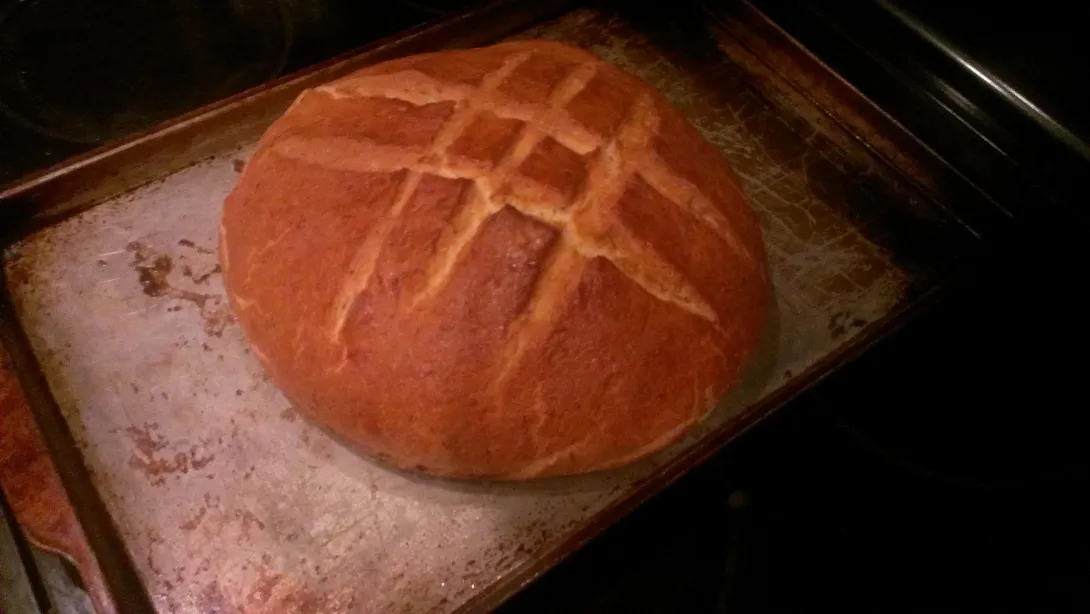
Hi, my name is Allen Hundley. I'm a 17 year old web developer in Florida, and I have taken an interest in baking. :)
I know this is probably a terrible idea (It has turned out well so far.) but I've been creating my own recipes. I used information on this site, mainly all of the tutorials, and my first loaf was an attempt at a boule spiced bread, surprisingly it turned out, and I went out and bought more flour and yeast. :)
This first loaf was basically my attempt to see if I had learned anything from the tutorials, so I tried everything I thought I knew how to do. All though I foolishly did not write down the recipe, I do recall that other than the obvious ingredients I included whole milk, honey, olive oil, basil and oregano. I raised the bread three times, then basted with olive oil and egg before scoring, then popped it in the oven, steaming every 5-10 minutes. The result was outstanding, light thin crust, subtle taste of the herbs, rich flavor, etc. The one thing I did not like was that after the first few hours it was relatively dense, whether this was from insufficient needing on my first loaf or not, we will never know. In my next load I added an egg white to remedy this problem.
I do have the recipe for my second loaf, which had an excellent taste, but was a terrible attempt at a batard. I'll probably be asking a lot of questions around here, thanks guys!
Welcome. Hope you find some good information.
Here's some advice from me. While its certainly tempting to just jump in and make up things as you go, I have seen many new bakers become discouraged because they tried to start inventing recipes without first learning the basics. My suggestion (and I'm sure you'll get other advice too) is to strictly follow well-established recipes and learn WHY they work. Once you've got a good handle on the basics, you'll find it much easier to experiment.
If you have a local library stocked with cook books, I can definitely recommend Peter Reinhart's "The Bread Baker's Apprentice" which provides a good variety of recipes and also contains a great deal of information on the science behind baking. Its what turned me from a novice into a hobbist.
Best of luck, and have fun!
I too would recommend that you find an established recipe and follow it exactly, taking notes as you do each step. Then it is much easier to diagnose problems, and make adjustments. I would also recommend that, at the minimum, you get a scale to measure everything by weight, an oven thermometer to calibrate your oven, and an instant read thermometer to check doneness. I wasted months floundering around, going from recipe to recipe, improvising here and there, to great frustration. Once I settled down with one or two recipes, and took notes, things improved rapidly.
The book I bought was Hamelman's Bread.
All the best,
Dave
Well, first off, thanks for the welcome guys.
Second, there are a few reasons I like to do it the hard way. The first being I have an insatiable appetite for knowledge, and it's not as satisfying to me unless I reinvent the wheel for some reason. I'm not exactly sure why, but you know. In other words, I don't like to be told, I like to be coaxed and then figure it out myself. Aside from that, I'm a hobby hopper. Once I figure the basics of something out, and can do a few basic projects, I pretty much drop the hobby. I think learning it myself will give me a bit more time here before the jump. :)
The advice given above is good. From what you say I very much doubt you will learn the basics with your approach.
This is very much a true saying, but I doubt that you will heed it. You have already said as much. "Those who will not learn from history are doomed to repeat it."
Ford
Thanks Ford. While I agree with you and George Santayana, I would really like to learn myself. To me, it seems that following recipes would teach less than experimenting, considering it does not explain the function of each additive.
All though I wont like it, if you feel it's impossible my way, I'll by all means start looking at recipes.
I have no objection to experimentation. As a research chemist, I could hardly object to experimentation. That said, I do strongly advise you try basic recipes to learn how the dough is supposed to feel, rise, bake, brown, look after baking (crumb & crust), and finally taste. I didn't get my Ph. D. by mixing chemicals without having some knowledge of what to expect. Yes, one can learn from his failures, but preparation results in fewer failures. "P. p. p. p. p. p.!"
Congratulations on recognizing the quotation, even though I did reword it slightly. You didn't get that knowledge from random reading of the dictionary.
In any case, I wish you well in your baking experience. After trying commercial yeast, learn to make your own sourdough leavening. That takes patience and the newly formed leavening will not be ready for baking until after two weeks or so, and will not be really mature until a month or so. I recommend the "pineapple solution" by Debra Wink for making a new starter. "The essence of baking is patience. The essence of sourdough baking is patience squared." ( Mike Avery, internet sourdough discussion group, 24 Sept. 2007)
If you have any questions on baking please do not hesitate to ask us. We are all standing by to help.
Ford